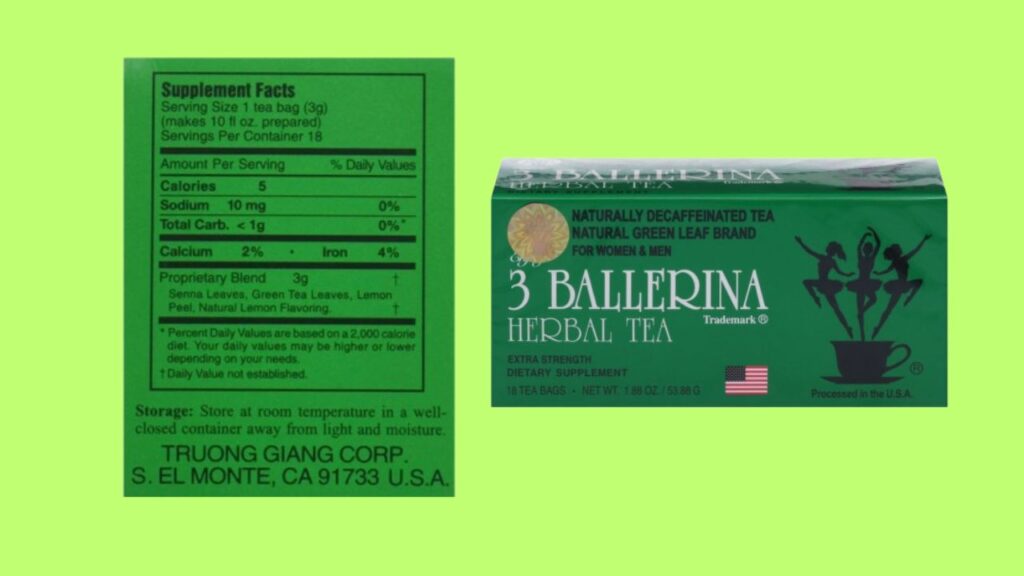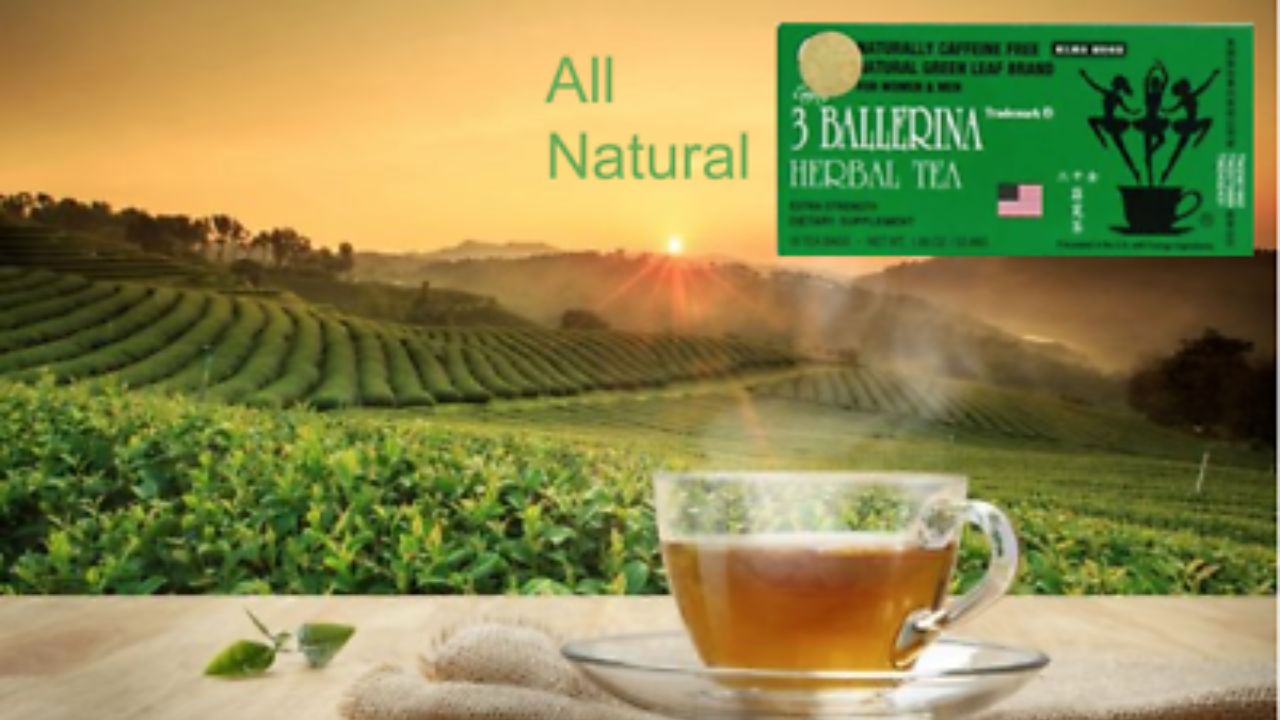Written By: Sherry Harris
Ballerina Herbal Tea is a popular choice for individuals seeking natural detox solutions. Known for its unique blend of ingredients, this tea offers a range of health benefits, including aiding digestion and supporting weight loss. In this article, we’ll explore whether Ballerina Herbal Tea contains caffeine, its nutritional profile, and the best ways to enjoy it for optimal results. Whether you’re a tea enthusiast or a curious newcomer, this guide covers everything you need to know.
Table of Contents
What is Ballerina Herbal Tea?
Ballerina herbal tea is a specialized blend designed for those seeking detox and weight management benefits. Originating in traditional Chinese medicine, it incorporates natural herbs to cleanse the digestive system. Its growing popularity stems from its effectiveness in promoting regular bowel movements and improving overall wellness.
Does Ballerina Herbal Tea Have Caffeine?
No, Ballerina Herbal Tea is entirely caffeine-free, making it a suitable option for individuals who are sensitive to caffeine or prefer herbal alternatives. Unlike traditional teas derived from the Camellia sinensis plant, this tea relies on ingredients like senna and Chinese mallow, which focus on digestive health rather than stimulation.
Its lack of caffeine also makes Ballerina Herbal Tea ideal for evening consumption, as it won’t disrupt your sleep. However, its laxative properties should be considered before bedtime to avoid discomfort. This unique aspect allows you to enjoy its detox benefits without the jitters or energy spikes associated with caffeinated beverages.
Ingredients in Ballerina Herbal Tea
Senna
Senna is a natural herb well-known for its potent laxative properties. It stimulates the muscles in the intestines to promote bowel movements, making it effective for relieving constipation. However, its strong effects mean that moderation is key to avoid dependency.
Malva
Malva, also called Chinese mallow, is a soothing herb that helps reduce inflammation and support digestion. It balances the intensity of senna, ensuring the tea is gentle enough for regular use. Malva also contributes to reducing bloating and calming the stomach.
Other Additives
Some versions of ballerina tea include additional ingredients like licorice or citrus extracts. These additives not only improve the taste but also provide added health benefits such as reduced inflammation or enhanced immunity. They make the tea more enjoyable for diverse palates.

3 Ballerina Herbal Tea Benefits
Nutritional Facts of Ballerina Tea
Ballerina Herbal Tea is low in calories and free from sugar, making it a great choice for health-conscious individuals. Its ingredients are rich in antioxidants and compounds that support digestion and detoxification. While it doesn’t provide significant macronutrients, its herbal blend focuses on promoting overall wellness.
| Nutrition Facts | Amount per Serving |
|---|---|
| Calories | 0 |
| Caffeine | 0 mg |
| Sugar | 0 g |
| Active Ingredients (Senna, Mallow) | Herbal Blend (Proprietary) |
This nutritional profile highlights the tea’s primary focus on detoxification rather than providing traditional nutrients.
Do You Know?
👉 Does Tazo Chai Tea Have Caffeine?
👉 Does Arizona Green Tea Have Caffeine?
How to Brew Ballerina Herbal Tea
Steps to Prepare
To prepare ballerina herbal tea, start by boiling fresh water and pouring it over a tea bag. Let the tea steep for 5–10 minutes, depending on how strong you prefer it. Once steeped, remove the tea bag and enjoy it warm or chilled.
Tips for the Best Taste
For the best experience, begin with shorter steeping times to gauge your tolerance to the tea’s effects. You can also add natural sweeteners like honey or a slice of lemon to enhance the flavor. Avoid over-steeping, as it can make the tea too bitter or overly potent.
Alternatives to Ballerina Herbal Tea
If you’re seeking alternatives to Ballerina Herbal Tea, several herbal options offer similar benefits, such as detoxification, improved digestion, and weight management support. Each alternative has its own unique blend of ingredients and properties to suit different preferences and needs. Here are five notable alternatives to consider:
Senna Tea
Senna Tea is a close alternative to Ballerina Herbal Tea, as it shares the same primary ingredient: senna. Known for its potent laxative properties, this tea helps relieve constipation and promotes digestive health. However, it should be used sparingly to avoid dependency or dehydration. Like Ballerina Herbal Tea, it is caffeine-free, making it a great evening detox option.
Peppermint Tea
For those looking for a milder digestive aid, Peppermint Tea is a refreshing choice. This herbal tea soothes the stomach, alleviates bloating, and improves digestion without the strong laxative effect of senna-based teas. It’s also caffeine-free, making it suitable for relaxing moments throughout the day. Additionally, its cooling flavor can be a comforting option for those with sensitive stomachs.
Chamomile Tea
Chamomile Tea is another excellent caffeine-free alternative that promotes relaxation and supports digestion. While it doesn’t have the laxative effect of Ballerina Herbal Tea, it helps reduce bloating and supports overall gut health. This tea is ideal for those who want a gentler detox experience or prefer a calming beverage before bedtime.
Dandelion Root Tea
Dandelion Root Tea is a popular detox beverage known for its diuretic and liver-cleansing properties. It aids in flushing out toxins and improving digestion while being completely caffeine-free. This tea is a great choice for those focusing on liver health and reducing water retention, providing a different detox approach compared to senna-based teas.
Ginger Tea
Ginger Tea is a versatile herbal drink with digestive and anti-inflammatory benefits. Its warming properties help soothe the stomach, improve circulation, and support a mild detox. While it doesn’t have a strong laxative effect, it can be paired with other detox methods for a holistic approach. Additionally, Ginger Tea is caffeine-free, making it an anytime beverage.
| Alternatives | Caffeine Content |
|---|---|
| Senna Tea | 0 mg |
| Peppermint Tea | 0 mg |
| Chamomile Tea | 0 mg |
| Dandelion Root Tea | 0 mg |
| Ginger Tea | 0 mg |
These alternatives to Ballerina Herbal Tea provide various health benefits while maintaining a caffeine-free profile, ensuring a wide range of options for those seeking natural and effective detox solutions.
3 Ballerina Herbal Tea Benefits
Supports Weight Loss
Ballerina herbal tea is a favorite among those looking for quick weight management solutions. It works by flushing out excess water weight and improving digestion, leading to a slimmer appearance. While it can support a healthy diet, it should not be seen as a standalone weight-loss solution.
Improves Digestion
The senna in ballerina tea is a natural laxative, helping to alleviate constipation and promote regular bowel movements. Combined with malva, it creates a balanced blend that soothes the digestive tract and reduces bloating. This makes it an excellent option for those struggling with occasional digestive issues.
Detoxifies the Body
One of the standout benefits of ballerina herbal tea is its ability to cleanse the body. By eliminating toxins through its laxative and diuretic properties, the tea can leave you feeling lighter and more energetic. Regular detoxification with ballerina tea can also improve skin clarity and overall vitality.
Potential Side Effects
Overuse Concerns
Excessive consumption of ballerina tea can lead to dependency on its laxative properties, disrupting the body’s natural digestive rhythm. Overuse may result in a reduced ability to have normal bowel movements without the tea. It’s recommended to limit use to occasional detoxes rather than daily consumption.
Digestive Discomfort
Some people may experience cramping or bloating when first trying ballerina herbal tea. These side effects are typically due to the senna herb’s strong effects on the digestive system. To avoid discomfort, start with a small dose and observe how your body reacts.
Dehydration Risks
The tea’s diuretic properties can lead to dehydration if not balanced with sufficient water intake. When drinking ballerina tea, make sure to stay hydrated throughout the day. This will help mitigate any potential side effects like lightheadedness or dry mouth.
Who Should Avoid Ballerina Herbal Tea?
Certain groups, including pregnant or breastfeeding individuals, should avoid ballerina herbal tea due to its laxative effects. People with chronic digestive issues, such as Crohn’s disease or IBS, should also exercise caution. Additionally, those taking medications that interact with laxatives should consult a doctor before use.
Best Times to Drink Ballerina Herbal Tea
The best time to enjoy ballerina herbal tea is in the evening or after a heavy meal. Its laxative effects make it unsuitable for mornings or before important activities. Drinking it at the right time ensures you get the benefits without disrupting your daily routine.
Daily Intake of Ballerina Herbal
It is recommended to consume Ballerina Herbal Tea in moderation, typically 1-2 cups per day. Overuse may lead to dependency on its active ingredients, such as senna, and disrupt the body’s natural digestive processes. To maximize its benefits while minimizing risks, use the tea as an occasional detox aid rather than a daily routine.
When starting, it’s a good idea to monitor how your body responds, as some individuals may experience cramping or dehydration. Always pair Ballerina Herbal Tea with adequate hydration and a balanced diet for the best results. Consulting a healthcare provider before regular consumption is also advisable, especially for those with underlying health conditions.
Conclusion
Ballerina Herbal Tea is a caffeine-free, herbal beverage known for its detox and digestive health benefits. Its unique formulation caters to individuals seeking natural solutions for cleansing and occasional weight management. While it offers notable advantages, moderation is key to avoiding potential side effects.
Whether you’re looking for a soothing, caffeine-free tea or a periodic detox aid, Ballerina Herbal Tea can be a valuable addition to your wellness routine. By understanding its nutritional profile, recommended intake, and proper usage, you can enjoy its benefits without compromising your health. Always remember to listen to your body and consult professionals for personalized advice.
Frequently Asked Question
Q. Is Ballerina Herbal Tea safe for daily use?
While Ballerina herbal tea can be beneficial, it is not recommended for daily use due to its strong laxative effects. Prolonged use may lead to dependency and disrupt natural digestive functions. Instead, it is best to use it occasionally for detox purposes, ensuring you balance it with a healthy diet and hydration.
Q. Can Ballerina Herbal Tea help me lose weight?
Yes, Ballerina herbal tea can support weight loss by reducing water weight and improving digestion. However, its effects are temporary, as it primarily helps with detoxification rather than fat loss. For sustainable weight management, pair it with regular exercise and a balanced diet.
Q. Are there any side effects of Ballerina Herbal Tea?
Yes, some users may experience side effects like cramping, bloating, or dehydration due to the tea’s laxative and diuretic properties. Overuse of Ballerina herbal tea can lead to dependency on its ingredients like senna. To minimize risks, use it in moderation and ensure you stay hydrated.
Q. Where to Buy Ballerina Herbal Tea
You can find ballerina herbal tea at reputable health food stores, Asian supermarkets, or online retailers. Look for trusted brands and read customer reviews to ensure you’re getting a high-quality product. Always check the ingredients to verify the tea is genuine and free from unnecessary additives.
Q. Can pregnant women drink Ballerina Herbal Tea?
Pregnant women should avoid Ballerina herbal tea due to its strong laxative effects, which can cause abdominal discomfort or other complications. The active ingredients like senna are not recommended during pregnancy. It’s always best to consult a healthcare provider before consuming herbal teas while pregnant or breastfeeding.

